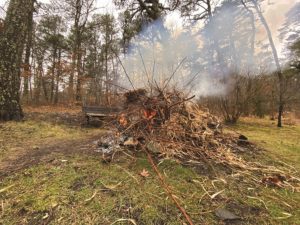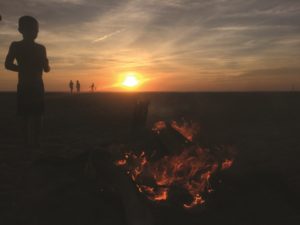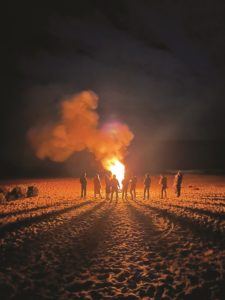When the fires of late winter and spring are lighted, they awaken old memories. All through my childhood, my brothers and I, alongside our parents, would rake and burn for days. We would start by collecting brush that had fallen, dragging piles of branches and hauling barrels of leaves to offer to the pile. It seems to me that we always had fires going in our yard at this time of year.

Burning is an annual ritual that is part of my personal story, but it is also part of a larger, deeper shared story. Burning feels purposeful, like something we are supposed to do.
The work always has a particular rhythm. In our yard, from time to time and without any announcement, everyone would convene around the fire. We would stand there listening to it pop, our attention fully consumed by the pine needles turning to flame and twisting into ashen threads. Then, as the fire burned down, someone would break away, and from across the yard would come the clatter of brush being gathered up and the rattle of a rake across the grass. Over and over again, we would disperse, back to building the pile, then again find ourselves collected in the fire’s presence.

Indigenous people on New England’s coasts used burning as an agricultural tool. Especially on the rocky land now called Maine, it kept the scrub from taking over fields and nurtured wild blueberry barrens. The wood ash brings trace minerals — calcium, potassium, iron, and boron — back to the soil. Burning destroys weed seeds and fungi. Its carbonates react with the soil, countering acidity.
The understanding of fire, its purposeful use and its relationship to the food we eat, is often credited with the development of our big, powerful, and sometimes annoyingly complex brains. Though fire may have helped our minds grow more complex, I find it has the power to do something that seems just the opposite. Staring into a fire’s breathing coals, mesmerized by its movement, I feel my mind wander freely. I wonder how many ideas that altered the course of the human story came into being while someone sat gazing into the coals.

Burning is so much a part of our natural calendar that we still have — with some restrictions — a season spanning midwinter to early spring when open burning is permitted. This ritual is so old and important to the collective that it is written into law in our towns. In Wellfleet, where I live, that season is now. We hold it dear.
Venturing out into our little plots of land to collect the fallen and dead materials of the last year, we pile up broken locust branches and dry rose canes, taking all they have drawn from the soil, the air, and the water to create their living bodies. And when we commit them to that final element, we carry out a cleansing process for our landscapes, including our inner ones.
As their warmth and light are released, we stand in them one last time, marking the passage of storms and growing seasons past, ready for the new growth to come.



